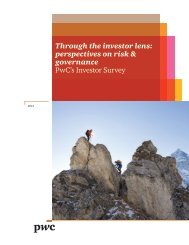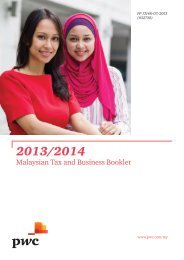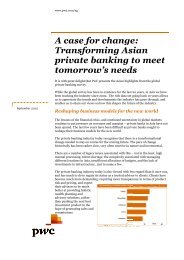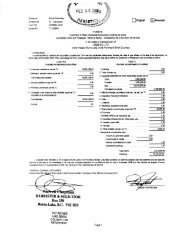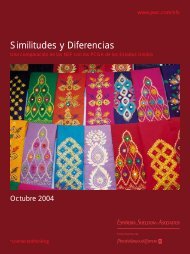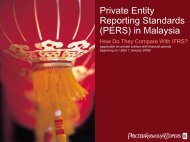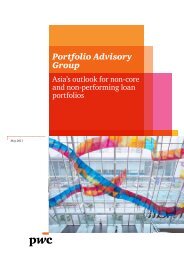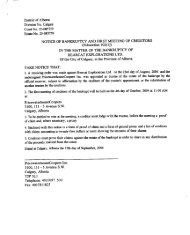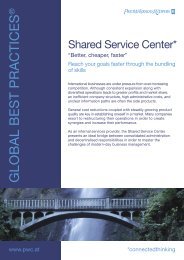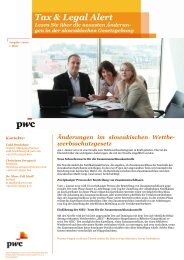TLS Newsletter 11 marzo 2011 - PwC
TLS Newsletter 11 marzo 2011 - PwC
TLS Newsletter 11 marzo 2011 - PwC
You also want an ePaper? Increase the reach of your titles
YUMPU automatically turns print PDFs into web optimized ePapers that Google loves.
Riforma della tassazione dei<br />
fondi comuni di investimento e<br />
delle SICAV di diritto italiano<br />
(Marco Vozzi)<br />
L’articolo 2, commi da 62 a 79, del D.L. n. 225/2010,<br />
convertito nella Legge n. 10/20<strong>11</strong>, prevede che, dal 1°<br />
luglio 20<strong>11</strong>, gli organismi di investimento collettivo del<br />
risparmio di diritto italiano, diversi dai fondi immobiliari<br />
(i.e.: fondi comuni di investimento e SICAV) ed i relativi<br />
investitori, saranno sottoposti ad un nuovo (e più competitivo)<br />
regime fiscale.<br />
In particolare, l’attuale regime tributario fondato sulla<br />
tassazione del risultato maturato dalla gestione (e quindi<br />
a prescindere da un effettivo realizzo di profitti in capo<br />
agli investitori) sarà abrogato e sostituito da un regime<br />
fiscale improntato su una tassazione per cassa al momento<br />
dell’effettivo realizzo di profitti da parte degli investitori.<br />
Conseguentemente, a partire dalla seconda metà<br />
dell’anno 20<strong>11</strong>, il trattamento tributario applicabile agli<br />
investitori in organismi di investimento di diritto italiano<br />
sarà comparabile a quello attualmente applicabile agli<br />
investitori in organismi di investimento di diritto estero.<br />
1. Cosa cambia per i fondi comuni di investimento e le<br />
SICAV di diritto italiano<br />
Dal 1° luglio 20<strong>11</strong>, i fondi comuni di investimento e le SI-<br />
CAV di diritto italiano non saranno più soggetti all’applicazione<br />
di un’imposta sostitutiva del 12,5% sul risultato<br />
maturato della gestione. Ne consegue che, a partire dalla<br />
seconda metà dell’anno 20<strong>11</strong>, i fondi comuni di investimento<br />
e le SICAV di diritto italiano non saranno più<br />
soggetti ad alcuna imposizione sui redditi (né ad imposte<br />
ordinarie o sostitutive).<br />
I risultati negativi di gestione maturati in passato, e fino<br />
al 30 giugno 20<strong>11</strong> (con riferimento ai quali i fondi comuni<br />
di investimento e le SICAV di diritto italiano hanno<br />
contabilizzato significativi “crediti di imposta” – pari al<br />
12,5% dei risultati negativi di gestione), potranno essere<br />
utilizzati, senza limiti di tempo, in compensazione dei<br />
futuri redditi (soggetti alla ritenuta del 12,5%) realizzati<br />
dagli investitori. Più in dettaglio, le società di gestione<br />
del risparmio italiane avranno la possibilità di compensare<br />
le imposte trattenute agli investitori con i “crediti di<br />
imposta” contabilizzati dagli organismi di investimento<br />
da esse gestiti.<br />
2. Cosa cambia per gli investitori<br />
2.1. Investitori residenti che non conseguono redditi di<br />
impresa (e.g.: persone fisiche)<br />
New tax regime for Italian<br />
investment funds and SICAVs<br />
(Marco Vozzi)<br />
According to Art. 2, par. from 62 to 79, Law Decree no.<br />
225/2010, converted into Law no. 10/20<strong>11</strong>, starting from<br />
next July 1, 20<strong>11</strong>, a new (more competitive) tax regime will<br />
apply to investors in Italian investment funds (other than<br />
real estate funds) and SICAVs.<br />
Particularly, the existing regime whereby investors in<br />
Italian investment funds and SICAVs are normally subject<br />
to tax on an accrual basis (and therefore on any unrealized<br />
gains) will be repealed and replaced by a regime based on a<br />
cash basis taxation system where investors will be required<br />
to pay taxes only upon actual realization of profits.<br />
As a consequence, starting from mid 20<strong>11</strong>, the tax regime<br />
applicable to investors in Italian investment funds and<br />
SICAVs will be comparable to that currently applicable to<br />
investors in non-Italian investment funds.<br />
1. Changes at the level of Italian investment funds and<br />
SICAVs<br />
Starting from next July 1, 20<strong>11</strong>, Italian investment funds<br />
and SICAVs will no longer be subject to the annual 12.5%<br />
substitutive tax applicable, on an accrual basis, on the<br />
yearly NAV appreciation. Accordingly, starting from mid<br />
20<strong>11</strong>, Italian investments funds and SICAVs will no longer<br />
be subject to any Italian income taxes (neither ordinary nor<br />
substitutive taxes).<br />
Yearly NAV depreciation incurred over past years, and until<br />
next June 30, 20<strong>11</strong> (in respect of which Italian investment<br />
funds and SICAVs have booked huge amounts of “tax<br />
assets” – equal to 12.5% of the NAV depreciation), can be<br />
carried forward indefinitely to offset future profits (subject<br />
to a 12.5% withholding tax) realized by the investors. More<br />
in details, Italian asset management companies will be in<br />
a position to offset payment of taxes withheld to investors<br />
with the “tax assets” booked by the Italian investment funds<br />
and SICAVs they are managing.<br />
2. Changes at the level of the investors<br />
2.1. Italian resident investors who do not carry on a commercial<br />
activity (e.g.: individuals)<br />
33 <strong>TLS</strong> <strong>Newsletter</strong> n° 3 Anno 20<strong>11</strong>



